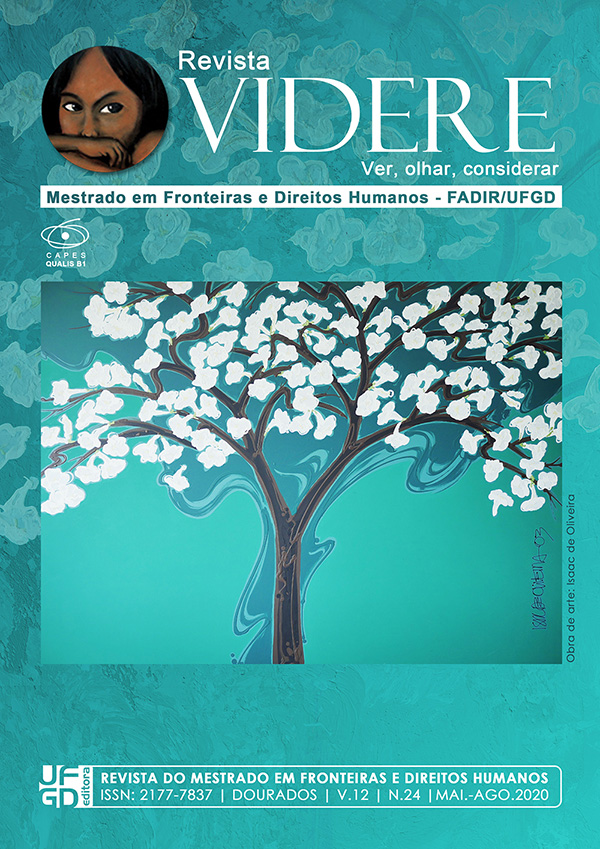Institutional and symbolic violence as antinomy of law: for non-violence as fundamental legal preceito
DOI:
https://doi.org/10.30612/videre.v12i24.11220Keywords:
State violence. Wars and violence. Non-violence.Abstract
This article aims to study the violence materialized through the acts of wars between nations and the actions of the State – at the national level – as a monopoly on public and institutional violence or said to be legitimate and authorized by the legal norm. Thus, we intend to analyze the types and forms of violence listed by the main political theorists in order to finally understand how nonviolence takes shape and foundations and tends to present itself as a social, legal and legitimately possible alternative as a factor in confronting state violence. With theoretical and methodological foundations in Hannah Arendt, Celso Lafer, Jean-Marie Muller, and Gene Sharp we aim to counter violence versus active and socially organized nonviolence.Downloads
References
ADORNO, Sérgio. Monopólio estatal da violência na sociedade brasileira contemporânea. In Miceli, Sérgio (org) O que ler na Ciência Social brasileira (1970-2002). São Paulo: Sumaré/Anpocs, 2002, Volume 4.
ALMEIDA, Guilherme Assis de. Direitos Humanos e Não-violência. São Paulo: Editora Atlas, 2001.
ARENDT, Hannah. Da Violência. Brasília: UnB, 1985.
ARENDT, Hannah. Homens em Tempos Sombrios. Tradução: Denise Bottmann. São Paulo: Companhia das Letras, 2008a.
ARENDT, Hannah. O que resta de Auschwitz. São Paulo: Biotempo Editorial, 2008b.
BITTAR, Eduardo Carlos Bianca; ALMEIDA, Guilherme de Assis. Curso de Filosofia do Direito. São Paulo: Atlas, 2012.
GADEA, Carlos A. A Violência e as Experiências Coletivas de Conflito. In: Revista Crítica de Ciências Sociais. Coimbra, n. 92, março/2011, p. 75-98.
HARI, Johann. Na Fissura: Uma História do Fracasso no Combate às Drogas. Tradução: Hermano Brandes de Freiras. São Paulo: Companhia das Letras, 2018.
HOBSBAWM, Eric. A Era dos Extremos: O breve século XX. Tradução: Marcos Santarrita. 02 ed. São Paulo: Companhia das Letras, 1995.
LAFER, Celso. Paz e Guerra no Terceiro Milênio: Os ideais de Bobbio, balanço e perspectivas. In: TOSI, Giusepe (Org.). Norberto Bobbio: Democracia, Direitos Humanos, Guerra e Paz. João Pessoa, Edita da UFPB, 2013.
LOSURDO, Domenico. A Não Violência: Uma história fora do mito. Rio de Janeiro: Revan, 2012.
MEI, Eduardo. Estado, Guerra e Violência: As “Novas Guerras” e suas Implicações para a Teoria Clausewitziana da Guerra. In: SAINT-PIERRE, Hector Luis (Org.). Paz e Guerra: Defesa e segurança entre as nações. São Paulo: Editora Unesp, 2013.
MENDONÇA, Sônia Regina de. Estado, Violência Simbólica e Metaforização da Cidadania. In: Revista Tempo. Rio de Janeiro: v. 1, 1996, p. 94-125.
MULLER, Jean-Marie. O Princípio da Não-Violência: Uma trajetória filosófica. Tradução: Inês Polegato. São Paulo: Palas Athena, 2007.
OMS. World report on violence and health. Geneva, World Health Organization, 2002.
PAUPÉRIO, Arthur Machado. O Direito Político de Resistência. Rio de Janeiro: Forense, 1962.
PÉREZ, Jesús Castañar. Breve História de La Acción Noviolenta. Madrid: Ediciones Pentapé, 2010.
SAAD TOSI, Lamia Jorge. A Banalização da Violência e o Pensamento de Hannah Arendt: Um debate ou um combate? In: Revista do Laboratório de Estudos da Violência da UNESP. Marília, edição 09, p. 131-159, maio. 2013, p. 84-94.
SANTOS, José Vicente Tavares dos. A violência simbólica: o Estado e as práticas sociais. In: Revista Crítica de Ciências Sociais. Coimbra, n. 108, dezembro/2015, p. 183-190.
SHARP, Gene. Da Ditadura à Democracia: Uma estrutura conceitual para a libertação. 04 ed. Trad. José A. S. Filardo. São Paulo: Palas Athena, 2010.
VIEIRA, André Luiz Valim. Violência, Direitos Humanos e Genocídio. Revista do Laboratório de Estudos da Violência da UNESP. Marília: n. 09, p. 01-11, maio/2012, p. 84-94.
WEBER, Max. Ciência e Política: Duas vocações. Tradução: Leonidas Hegenberg e Octany Silveira da Mota. 18 ed. São Paulo: Cultrix, 2011.
ZIZEK, Slavoj. Violência: seis reflexões laterais. Tradução: Miguel Serras Pereira. São Paulo: Boitempo, 2014.
Downloads
Published
How to Cite
Issue
Section
License
Authors must accept the publication rules when submitting the journal, as well as agree to the following terms:
(a) The Editorial Board reserves the right to make changes to the Portuguese language in the originals to maintain the cultured standard of the language, while respecting the style of the authors.
(b) Authors retain the copyright and grant the journal the right to first publication, with the work simultaneously licensed under the Attribution-NonCommercial-ShareAlike 3.0 Brazil (CC BY-NC-SA 3.0 BR) that allows: Share - copy and redistribute the material in any medium or format and Adapt - remix, transform, and create from the material. CC BY-NC-SA 3.0 BR considers the following terms:
- Attribution - You must give the appropriate credit, provide a link to the license and indicate whether changes have been made. You must do so under any reasonable circumstances, but in no way that would suggest that the licensor supports you or your use.
- NonCommercial - You may not use the material for commercial purposes.
- Sharing - If you remix, transform, or create from material, you must distribute your contributions under the same license as the original.
- No additional restrictions - You may not apply legal terms or technological measures that legally restrict others from doing anything that the license permits.
(c) After publication, authors are allowed and encouraged to publish and distribute their work online - in institutional repositories, personal page, social network or other scientific dissemination sites, as long as the publication is not for commercial purposes.



















